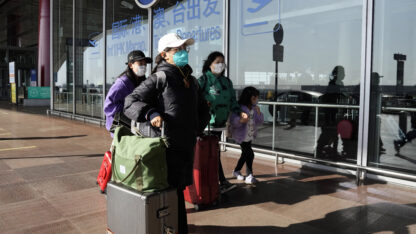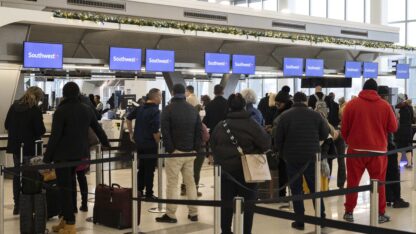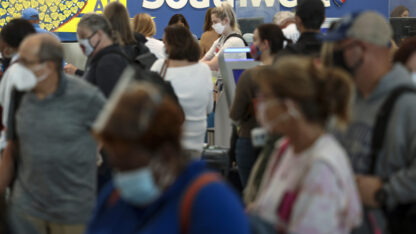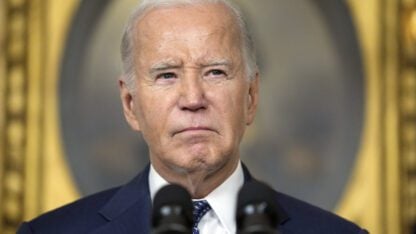A winter storm led Southwest Airlines to cancel thousands of flights over the holiday season at the last minute. And a good chunk of the hundreds of thousands of stranded or delayed passengers still have no idea where their luggage is.
Airlines were already bracing for a chaotic travel season expected to generate a turnout similar to what airports experienced before the pandemic. Dangerous winter storms across the country only exacerbated this, leading every major airline to cancel or delay flights as the weather raged on.
And one airline in particular — Southwest Airlines — took a significant hit. A blizzard caused the company to cancel 60% of its flights, effectively leaving hundreds of thousands of travelers stranded. But regardless, whether passengers were able to make it to their final destination or spent the holidays at home, it seems as if many people are still trying to find their luggage.
“I’ve never seen a meltdown of this size, it’s the worst I think we’ve ever seen,” said William J. McGee, a senior fellow for Aviation and Travel at the American Economic Liberties Project.
McGee, who has been researching the airline industry since 1985, called the mass flight cancellations from Southwest “unprecedented.”
“There is no relief in sight,” he continued. “It’s impossible to guess when things are getting back to normal.”
On Tuesday, Southwest Airlines CEO Bob Jordan publicly apologized to its customers. Jordan said that the airline decided to cancel flights “after days of trying to operate as much of our full schedule across the busy holiday weekend,” and said he has contacted U.S. Secretary of Transportation, Pete Buttigieg.
“I want everyone who is dealing with the problems we’ve been facing, whether you haven’t been able to get to where you need to go or you’re one of our heroic employees caught up in a massive effort to stabilize the airline, to know is that we’re doing everything we can to return to a normal operation,” Jordan said in the video. “And please also hear that I’m truly sorry.”
Bri Murphy, and her husband, Peter Ferguson, planned to fly from Nashville to Denver on Christmas Day. While at the airport, the pair watched Southwest continue to delay their flight before eventually cancelling it altogether. Now, they’re waiting to get on another flight.
But their luggage, the pair soon found out, did make it to Denver without them. Murphy’s father-in-law, who lives in Denver, was able to drive to the airport and find two of their suitcases. But a third — containing Christmas gifts and Murphy’s medication — is still somewhere in the pile.
And while Murphy waits to be reunited with her suitcase, she continues to rack up hundreds of dollars in costs, transporting herself to and from the airport and replacing some of her belongings.
“There’s been all kind of these collateral effects that have been frustrating to work through,” she said.
Southwest Airlines differs from other major airlines, like Delta or American, because it follows a point-to-point model, as McGee explains.
“What you’re doing with Southwest is, you’re checking a bag from the first city to the second city, and then rechecking it into the third city,” he said. “Whereas with American, Delta or United, you’re checking a bag from the origin city all the way to the destination.”
The point-to-point system, in which planes fly from one smaller airport to another, used to be the norm for airlines until the federal government deregulated airlines in 1978. Now, most major airlines instead follow a hub-and-spoke system where routes are connected to a major hub.
Another issue, according to McGee, is the lack of oversight the airline industry has. McGee and the rest of the American Economic Liberties Project published model legislation in September that would remove the Department of Transportation as the industry’s sole regulator.
“After a summer of flight cancellations, delays, and withheld refunds, eliminating the airlines’ liability shield will shift the power back to consumers, state AGs, and state courts and legislatures, forcing the airlines to finally stop mistreating and cheating flyers,” McGee said in a press release announcing the model legislation.
After Brittney Buckley’s flight from Denver to Chicago, where her family lives, got canceled, she was able to rebook another flight that got her there days before Christmas.
Although the airline told her that her bags would be waiting for her in Chicago, the airtags, a tracking device by Apple, on her luggage — containing winter clothes, Christmas presents and her prescription medicine — showed that that they were still in Denver. She suspects that they’re somewhere buried under the mountains of bags that now litter the airport’s baggage claim.
And as she prepares to get fly back to Denver, she isn’t sure when she’ll see them again.
“I’m just one of many millions of people waiting in this corporate machine to get an answer,” she said. “And I know we don’t have that much power. I’m just waiting until a few days have passed so I can get another update on my luggage. At this point, I have written it all off.”
And in case her flight back home gets canceled, she’s got another plan: she’ll brave the 14-hour drive back home with a friend.
Although her husband frequently travels with Southwest for work, Murphy isn’t sure if she’ll ever fly the airline again.
“I think it depends, for me, on what kind of changes actually happen over the next couple months,” she said.
Copyright 2022 NPR. To see more, visit https://www.npr.org.
9(MDAxODM0MDY4MDEyMTY4NDA3MzI3YjkzMw004))

9(MDAxODM0MDY4MDEyMTY4NDA3MzI3YjkzMw004))








